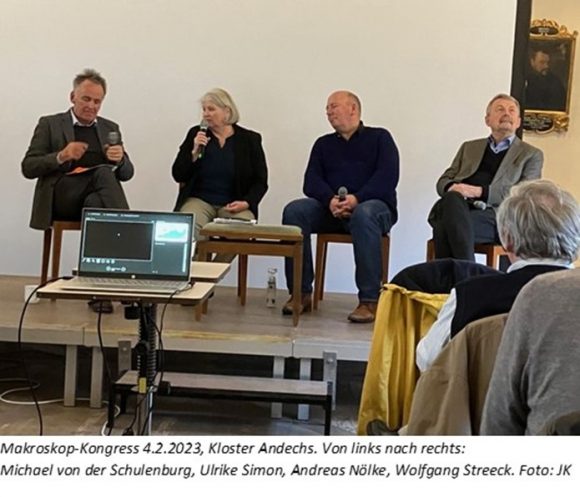This year’s congress of the Macroscope magazine instead of. Makroskop is a magazine with a focus on economic policy, but is also open to other topics.
The congress focused on the question of whether the nation state is outdated in the age of globalization, a relic of state building in the 19th century, or whether this is possibly a wrong view of things. There was input from, among others Andreas Noelkeco-editor of Makroskop, political scientist in Frankfurt, former director of the Max Planck Institute for the Study of Societies Wolfgang Streeck and the former top diplomat Michael von der Schulenburgmoderated by Ulrike Simon.
In principle, the three agreed that it was too early to say goodbye to the nation state and that the nation state may continue to offer the best conditions for peace, the rule of law and democracy compared to the realistic alternatives in the future. So far, supranational organizations such as the UN or the EU have not been able to keep the various social subsystems, from companies to social security or schools to the police, in a binding, mutually related order.
A look at the worldwide situation shows that non-functioning states are the central problem for peaceful coexistence of people in many regions, for example where drug gangs, militias or civil war factions determine everyday life. It is necessary for a state that the citizens perceive and accept themselves as a community, as a people, or as a “nation”. Whereby what constitutes a “nation” has not been specifically determined, at least not positively: All three have distanced themselves from ethnic, religious or cultural homogeneity as the normative basis of the “nation”, i.e. the conservative understanding of “nation”, and in particular versus the nationalist invocations of “nation” on the right-wing political spectrum. The conceptual void “nation” is a tricky one, because anything that has a communalizing effect can also have an oppressive and excluding effect. This applies in particular to verbal hypostases of something common such as “nation” or “people”.
As a case study for the attempt to impute state structures without a “nation”, von der Schulenburg addressed Afghanistan: An estimated 4 trillion dollars had been used there in the course of the western intervention, ultimately without success. It was not possible to establish and maintain state structures in Afghanistan without the sustainable foundation of a common national self-image. The total is indeed staggering. This would have made it possible to eliminate hunger in the world in the long term – if one could rely on functioning state structures, and above all: if one wanted to do so. It is easier to mobilize money for wars than for bread.
There was also a whole series of other points of discussion, e.g. the ambivalent role of the USA as a “continental unifier” in Europe after a phase of “constructive decay” of hierarchical concepts of order in the EU, the new geopolitical developments, false conformism or, as the economist pointed out Hartmut Reiners one, the economic sense of welfare state regulations and the problem that capital-covered insurances are no longer politically controllable due to the dependency on the global financial markets. Incidentally, there is also an instructive case study for this: the financial crisis of 2007 and the stepping-in of the national state to protect the investments of private insurance companies.
Exciting – and exciting – topics. A little more discussion time would have been good to critically question the complex inputs. Thinking is easier in a conversation than just listening, and thoughtful things are of course also welcome here in the comment column.
———————-
Addendum 2/11/2023: Makroskop has my congress gleanings posted online on its website.
